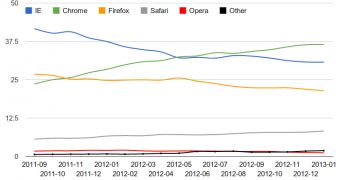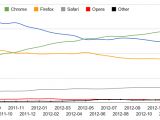It seems like the start of 2013 was a rather slow one in the browser market as not much has happened since the start of the year. At the end of January 2013, Chrome and IE have pretty much the same market share as they had at the end of 2012. If anything, Firefox and Safari saw the biggest changes, a rare occurrence.
At the end of January, Chrome still held a comfortable lead with 36.52 percent market share, as far as StatCounter is concerned. It started the year with 36.42 percent, so the change is minimal to say the least.
At the same time, IE saw an even smaller change, going from 30.78 percent market share at the end of 2012 to 30.71 percent in January.
Firefox continued its slow decline as well, going from 21.89 percent market share to 21.42 percent market share. Meanwhile, Safari climbed over the eight percent mark, going from 7.92 percent in December to 8.29 percent in March.
Anything could happen, but it's likely that these will be the trends for 2013, Chrome will continue to gain but it's growth may slow down, IE will continue to drop but slowly and Firefox may continue to lose market share, though it could stabilize at some point.
It's hard to see any major changes, Windows 8 is not popular enough to push IE adoption and people can use Chrome or Firefox just as well as IE10.
Chromebooks are selling in record numbers, in the US at least, but it's unlikely that this will cause any noticeable uptake in Chrome usage.
All the regular caveats apply, the numbers represents visits seen by StatCounter, which offers analytics tools, on the sites it is used on. While it's a great number of websites, they're not necessarily representative of the global internet. Net Applications, for example, saw Chrome's market share decline in January 2013.

 14 DAY TRIAL //
14 DAY TRIAL // 
